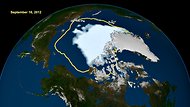As the Arctic melts, the US, Russia and several European Union (EU) nations are lining up to exploit its oil, gas and minerals and to take advantage of the newly ice-free region for shipping shortcuts.
The record pace of this year’s Arctic ice melt has captured heightened interest from China, a country with no historical claims on the territory, reports The New York Times.
In August, China sent its first ship across the Arctic to Europe; its dependence on exports make a polar shipping route enticing, because it would save time and money. The country has also acquired interests in two Canadian oil companies.
More significantly, the country is lobbying to become a permanent observer on the Arctic Council, an increasingly influential group of eight nations that guides policy decisions for the region. The EU, Japan and South Korea have also applied for permanent observer status to have a say in development and trade accords covering the region.
China sent high-level government representatives this year to Denmark, Sweden, Iceland (where it has signed a geothermal pact) and Greenland, where it is interested in developing a mining industry, reports the NY Times.
It is China’s visit to the latter country that has the US and other western nations worried, because the retreat of ice on Greenland has exposed valuable rare earth minerals. The EU is worried that Greenland could grant China exclusive rights to those minerals.
Greenland has received many visits from foreign diplomats in the past 18 months, including US Secretary of State Hillary Clinton and South Korea Prime Minister Lee Myung-bak.
All because its ice is melting.
"We are treated so differently than just a few years ago," Jens Frederiksen, Greenland’s vice premier, told the NY Times. "We are aware that is because we now have something to offer, not because they’ve suddenly discovered that Inuit are nice people."
At one point over the summer, 97% of Greenland’s ice sheet was melting. Scientists now predict that Arctic summers could be ice-free within this decade.
"Things are happening much faster than what any scientific model predicted," Dr. Morten Rasch, who runs the Greenland Ecosystem Monitoring program at Denmark’s Aarhus University, told the NY Times.
Arctic sea ice finally stopped melting for the year on September 16. Ice covers just 24% of the Arctic Ocean – a record low, according to the National Snow and Ice Data Center.
The NASA image below shows how this year’s low compares with the average minimum over the past 30 years.

Technically speaking, ownership of the Arctic is governed by the United Nations Convention of the Law of the Sea. That gives nations in the region the rights to economic zones that extend 200 nautical miles out from the land, including undersea resources that are on the continental shelf.
The US has never formally staked out its Arctic boundaries because the Senate has refused to ratify the UN convention, even though it established a military presence in Greenland to protect its interests there. But China’s heightened interest could change things.
A decision about which countries will be granted permanent observer status on the Arctic Council is expected next February. So far, Iceland, Denmark and Sweden all publicly support China’s bid to join.
No matter what happens, it appears the Arctic ice melt has made the region more vulnerable to economic development than ever – despite the very real environmental threats of doing so.
The United Nations Environment Program (UNEP) warns that opening the Arctic to shipping and oil and gas industries will melt the ice even faster.
The "black carbon" soot generated by those industries darkens the ice, allowing it to absorb more of the sun’s heat. Black carbon is a leading "climate forcer," which is accelerating climate change by as much as 50%.
"There is a grim irony here that as the ice melts…humanity is going for more of the natural resources fuelling this meltdown," Nick Nuttall, a UNEP spokesman told Reuters.
"So far there has been little actual exploitation of Arctic resources. Greenland has only one working mine, though more than 100 new sites are being mapped out. Here, as well as in Alaska, Canada and Norway, oil and gas companies are still largely exploring, although experts estimate that more than 20 percent of the world’s oil and gas reserves are in the Arctic. Warmer weather has already extended the work season by a month in many locations, making access easier," says the NY Times.
Here’s the New York Times article about the Arctic’s vulnerability to development:

China will be much better than the Hitler’s Germany. The world must be very careful in dealing with China. Greenland must be very careful to not give anything to Chinese companies or to be very vigilant where any collaboration is there with any of them. If not You Loose everything and will have no time to regret.We must remember at all times that the population of China was never free. It was always fed what the supreme counsel wanted them to be leave. The Chinese as a nation will always, as a country, nation, and as a race do what it is fed to do. . QED
I wonder if they discover rare earths in the Antarctic will they push the original signatories out of the way and go for it